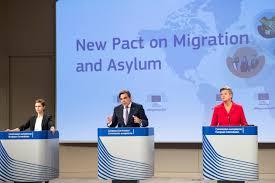
https://www.amnesty.org/en/latest/news/2024/04/eu-migration-asylum-pact-...
Ahead of the European Parliament’s final vote on the European Union (EU) Pact on Migration and Asylum on 10 April, Amnesty International warns that these reforms will put people at heightened risk of human rights violations.
“It is clearer than ever that this EU Pact on Migration and Asylum will set back European asylum law for decades to come, lead to greater suffering, and put more people at risk of human rights violations at every step of their journeys,” said Eve Geddie, Amnesty International’s Head of the European Institutions Office and Director of Advocacy.
“Since these reforms were first proposed in 2020, every step of the negotiations has further worsened the final outcome – weakening protections and access to asylum for people on the move, expanding detention and containment at borders, and further shifting responsibilities to countries outside of Europe. The Pact will do nothing to improve Europe’s response to people in need of protection.
“The European Parliament should be setting a higher standard for a humane and sustainable common asylum policy. However, this package of proposals shamefully risks subjecting more people, including families with children, to de facto detention at EU borders; denying them a fair and full assessment of their protection needs. The proposal will also open the door to new emergency measures that will put countless people at risk of pushbacks, arbitrary detention, and destitution at European borders.
“These proposals come hand in hand with mounting efforts to shift responsibility for refugee protection and border control to countries outside of the EU – such as recent deals with Tunisia, Egypt, and Mauritania, or attempts to externalize the processing of asylum claims to Albania. These practices risk trapping people in states where their human rights will be in danger, render the EU complicit in the abuses that may follow, and compromises Europe’s ability to uphold human rights beyond the bloc.”
Background
The final vote in the European Parliament on several regulations that comprise the Migration and Asylum Pact is due to take place on Wednesday 10 April at 17:00 CET. The proposals will be formally adopted after the European Council endorses them, before June 2024. The new legislation is expected to come into force and be fully operational two years later, by June 2026.
https://crd.org/2024/02/27/new-european-union-migration-pact-undermines-....
What is the EU Migration Pact?
The EU’s Pact on Migration and Asylum is the result of three years of negotiations between EU Member states to create a joint migration and asylum policy. On 20 December 2023, the European Commission, Council of the EU, and European Parliament made a deal that will likely be voted on and adopted in the first half of 2024.
The Pact negotiations began in reaction to the European Migration Crisis in 2015, when more than 1 million asylum seekers arrived in Europe fleeing war and ethnic conflict in Syria, Afghanistan, Iraq, Libya, and Eritrea. The pact began with the goal of finding a way for member states to work together to take in asylum seekers equitably, relieving pressure on Europe’s southern border countries that receive the majority of migrants. However, instead of sharing the number of asylum seekers, the pact agreed on a new, byzantine “solidarity mechanism.” This mechanism allows countries to forgo taking in asylum seekers and instead pay into a fund to strengthen borders and to pay countries outside the EU to actively prevent migrants from making their way into the EU.
Among other things, the Pact also:
- Increases the use of substandard accelerated asylum procedures at the border, even for children in families, which will also likely lead to the increased use of detention.
- Allows states to opt out of several EU asylum rules during vaguely defined times of crisis.
- Increases the use of biometrics and surveillance, even fingerprinting children as young as 6 years of age.
What does this mean for refugees?
The new policy’s goal is to prevent refugees fleeing war, persecution, or natural disasters from making it into the EU and once in the EU, will make it more difficult for those requiring protection to receive asylum. In addition:
- Refugees will face a harsh asylum processing system that may send them back to dangerous situations and even death.
- More refugees will die at sea, as border countries will be incentivized to ignore boats in distress.
- Refugees will be forced to stay in or be sent to dangerous “safe third countries.” Already, these “externalisation” policies have led to migrants being abused in Tunisia and tortured in Libya.
The Swedish government has already appointed an investigation into adapting Swedish asylum policy to the minimum level required by the EU. The consequence of the EU Migration Pact and changed Swedish policy will be that a significant proportion of people in flight will suffer or die on long migration journeys. The right to seek and receive asylum from persecution is a basic human right– and more asylum seekers will suffer when they are denied the protection to which they are entitled.









